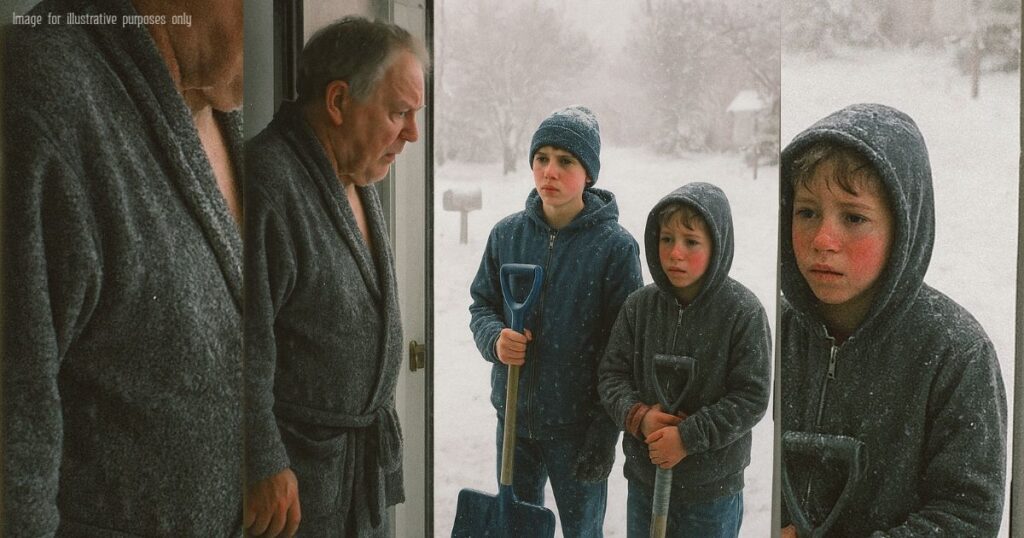His face did a new thing—half laugh, half ache. “Yes, sir.”
I stepped into the cold. The snow had softened into a listening kind of quiet. I was halfway down the walk when Elena called after me.
“Mr. Gable? Frank?” Her voice was careful, walking across a delicate surface. “If you ever need anything—anything at all—these two know where the good shovels are.”
That afternoon I did something I hadn’t done since my wife died.
I opened the hall closet where I keep what some people might call junk and I call memory—old signs from the plant picnic, a dented thermos, the wooden box where my father’s measuring calipers sleep.
I found the hand-lettered board I used to hang in the break room when we took on overtime: “We do it right. We do it together.”
Sunday after church, I drove to the hardware store.
I bought two decent snow shovels, a pair of insulated gloves, and a roll of reflective tape. On Monday evening, I tucked everything onto their porch with a note under a magnet shaped like a cardinal:
For Marcus and Leo—
Tools that match your character.
Price your work by your worth, not your fear.
—Mr. Gable
I expected nothing back. That’s an important part of giving: to not stand there with your hands out for the thank-you you think you earned.
But the world has its own ledger.
By Thursday, the town had heard the story—the way small towns hear stories, sideways and soft.
The Patel’s driveway was cleared before dawn.
Old Mr. Russo, who could only afford to tip with peaches in August, found his steps scraped clean. A pup we all call Daisy suddenly had a narrow path along the fence where she could patrol her kingdom without sinking to her belly.
On Friday night there was a knock at my door.
I opened it to find a pie tin held at chest height by a pair of woolen mittens. When the tin lowered, Elena stood there with the boys behind her like proud bookends.
“Payday,” she said.
“That looks like an apple pie,” I said, reverent.
“It is,” she said. “It’s also my attempt to repay the debt. But the boys say the only proper repayment is gashed knuckles and a respectful layer of sweat.”
“We can arrange all three,” I said, stepping aside.
We ate warm pie on my sofa with forks right from the tin, because that’s how the best pies go.
Marcus told me about a teacher who said he should try the accelerated class if he could find a way to get there early.
Leo asked if I’d ever driven a forklift and if it was true they could turn in their own length.
Elena nodded to the framed photo on my mantle—my wife at the lake, hair wild under a straw hat—and asked her name. I told them. The boys said it out loud once, carefully, as if getting it right mattered. It did.
Before they left, Marcus stood straight like he was about to speak at graduation.
“Sir,” he said, “about the twenty dollars. We were wrong.”
“You were honest,” I said.
“We were scared,” he said. “Scared the price would scare people off. But fear doesn’t shovel driveways. We’re sticking with the real number from now on.”
I looked at him—at both of them—and felt the old hall clock tick like a heartbeat in the quiet behind us. “Good,” I said. “Because men who undercharge grow bitter. Men who charge fair grow dependable. And dependable men build towns.”
They went back into the night, three shapes crossing a field of stars that had fallen to earth.
The house exhaled. Somewhere deep in the heat ducts, a settling pop. The kind of noises that used to sound like emptiness to me.
I washed the forks. I wiped the counter. I set the pie tin on the stove to remind myself that gratitude is not a concept; it’s a thing you can warm up and share.
Then I did something else I haven’t done in a long time: I wrote a note to pin to my own fridge.
Saturday morning, after the storm passes,
put on boots.
Walk the block.
Find the broken shovels.
Show the boys where the ice hides.
Let them show me where the light still lives.
We talk about the way things used to be as if goodness is a relic buried under new paint.
But standing in my kitchen with the smell of cinnamon in the air and snow hushing the world outside, I realized something simple and stubborn:
The old days aren’t behind us. The old days are any day we choose to make a fair price, shake hands without flinching, and carry one another’s weight without keeping score.
The doorbell rang again at 7 AM the next Saturday. This time, I wasn’t annoyed.
I was ready.
Thank you so much for reading this story!
I’d really love to hear your comments and thoughts about this story — your feedback is truly valuable and helps us a lot.
Please leave a comment and share this Facebook post to support the author. Every reaction and review makes a big difference!
This story is a work of fiction created for entertainment and inspirational purposes. While it may draw on real-world themes, all characters, names, and events are imagined. Any resemblance to actual people or situations is purely coincidenta


